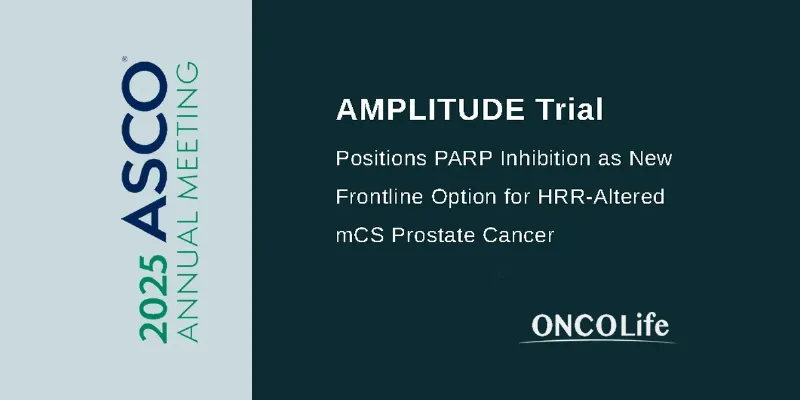AMPLITUDE: Niraparib Combo Improves rPFS in HRR-Altered mCS Prostate Cancer

4 June 2025
The Phase 3 AMPLITUDE trial showed that adding niraparib to abiraterone acetate and prednisone reduced radiographic progression or death by 37% in patients with metastatic castration-sensitive prostate cancer (mCSPC) and HRR alterations, and by nearly 50% in those with BRCA mutations. Symptomatic progression was also delayed, marking a potential new frontline treatment for HRR-altered mCSPC, particularly in BRCA-altered patients.
Emerging data from the Phase 3 AMPLITUDE study mark a significant advance in the treatment landscape for patients with metastatic castration-sensitive prostate cancer (mCSPC) harboring homologous recombination repair (HRR) genetic alterations. Presented at the 2025 ASCO Annual Meeting, the study demonstrated that the combination of niraparib—a highly selective PARP inhibitor—with abiraterone acetate plus prednisone (AAP) significantly improved radiographic progression-free survival (rPFS) compared to the standard of care alone.
A Landmark Study for HRR-Altered mCSPC
“Approximately 25 percent of patients with mCSPC have HRR alterations, with about half being BRCA. These patients typically experience faster disease progression and poorer outcomes,” said Dr. Gerhardt Attard, presenting author of trail and University College London Cancer Institute, “The AMPLITUDE trial is the first to show that combining a PARP inhibitor with an androgen receptor pathway inhibitor both delays disease progression and postpones the onset of symptoms in HRR-altered mCSPC, supporting this combination as a new treatment option for these patients.”
The AMPLITUDE trial, enrolling 696 patients with HRR alterations, is the first to show that adding a PARP inhibitor in this setting can meaningfully delay disease progression.
The trial’s primary endpoint was met: across the entire cohort, niraparib plus AAP reduced the risk of radiographic progression or death by 37% compared with placebo plus AAP (HR 0.63; 95% CI 0.49–0.80; p=0.0001). In patients with BRCA alterations—comprising roughly 55% of the cohort—the benefit was even more pronounced, with nearly a 50% risk reduction (HR 0.52; 95% CI 0.37–0.72; p<0.0001).
Enhancing Quality of Life
Beyond rPFS, the combination also significantly delayed the time to symptomatic progression—a key concern in advanced prostate cancer. Among patients with BRCA alterations, the risk of worsening symptoms requiring intervention was cut by 56% (HR 0.44; 95% CI 0.29–0.68; p=0.0001). In the broader HRR-altered population, the reduction was 50% (HR 0.50; 95% CI 0.36–0.69; p<0.0001).
Although overall survival (OS) data remain immature, interim analysis showed an early trend favoring niraparib plus AAP in patients with both BRCA alterations (HR 0.75) and any HRR alterations (HR 0.79).
Dr. Joaquin Mateo, who discussed the trial at ASCO, highlighted that while the benefit for BRCA mutations is clear, the data for other HRR mutations remain less certain due to smaller subgroup sizes. Additional studies—such as the ongoing TALAPRO-3 and EvoPAR-Prostate-01 trials—will be crucial to fully understand the role of PARP inhibition across this genetically diverse group.
Safety and Tolerability Considerations
Safety data were consistent with prior experience for these agents. Grade 3/4 adverse events were more common in the niraparib combination arm (75% vs. 59%), primarily anemia and hypertension. However, treatment discontinuation rates due to adverse events remained low (14.7% vs. 10.3%).
Dr. Attard emphasized that while the combination represents a promising new option, toxicity must be managed carefully to ensure that patients derive maximum benefit.
Implications for Practice
The AMPLITUDE data position niraparib plus AAP as a potential frontline standard for patients with HRR-altered mCSPC, particularly those with BRCA mutations. These results also underscore the importance of genetic testing in guiding treatment decisions—reinforcing the need for routine HRR testing at diagnosis.
“Our aim with the AMPLITUDE study was to determine how long patients could live without their cancer worsening. What we found is that the combination of niraparib, abiraterone acetate, and prednisone is achieving just that, with the goal of offering patients precious quality time before the disease enters a more resistant phase,” said Dr. Charles Drake, Vice President, Prostate Cancer and IDA Leader, at Johnson & Johnson IM. “This breakthrough highlights the need for early initiation of personalized treatment strategies for patients with mCSPC and HRR alterations, particularly BRCA.”
About AMPLITUDE Trial and AKEEGA® (niraparib and abiraterone acetate)
The Phase 3 AMPLITUDE trial (NCT04497844) is a randomized, double-blind, placebo-controlled, international study evaluating the safety and efficacy of niraparib and abiraterone acetate in a dual-action tablet (AKEEGA®), combined with prednisone and ADT, in patients with HRR gene-altered metastatic castration-sensitive prostate cancer (mCSPC). The primary endpoint is radiographic progression-free survival. AKEEGA®, approved in the U.S. and Europe for BRCA-mutated metastatic castration-resistant prostate cancer (mCRPC), combines niraparib, a PARP inhibitor, with abiraterone acetate, a CYP17 inhibitor. Additional marketing authorizations are under review, and the AMPLITUDE study continues to explore its role in HRR-altered mCSPC.











Comments
No Comments Yet!